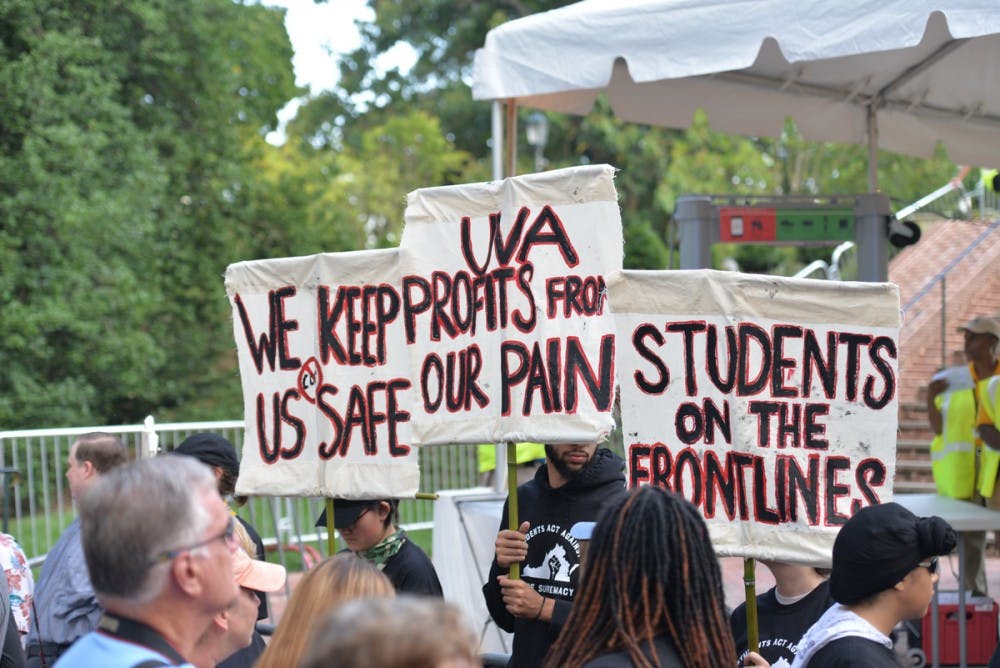A year ago, I wrote a column for The Cavalier Daily where I discussed possibilities for healing in the face of domestic terrorism. A year later, I write to offer more specific recommendations about what our university can do to align itself with its expressed commitment to diversity and inclusion.
To start, we have the opportunity to leverage our position as an institution of higher education to tackle white supremacy within the classroom. This must start with a more accurate portrayal of our country’s and university’s history. Our country was founded on the exploitation of black and brown people, and racist ideologies were employed to further enable and enhance this exploitation. As a tactic for maintaining the status quo, an honest portrayal of our nation’s history is intentionally excluded from K-12 education and many students are actually miseducated and taught lies. For example, findings from a recent survey show that just 8 percent of high school students knew that the Civil War was fought over slavery. Thus, we can only expect that many students do not arrive to our university equipped with a full understanding of our nation’s gruesome past. We can and should do more to remediate this situation.
To this end, we have several pedagogical options. One is to prepare more of our faculty to teach race in the classroom. Another is to hire more faculty who bring this expertise with them and can offer courses to expand our curricular offerings. A third is to incorporate dialogue-based courses that foster meaningful connection across difference while simultaneously teaching students about power, privilege and oppression. Dialogue that does not happen within the context of social justice pedagogy is unlikely to improve the racial climate at our university. A fourth is to ensure that all students are required to take at least one course that teaches about the role of social structures in creating and maintaining inequality.
In concert with curricular changes, it is time to more responsibly contend with Jefferson’s legacy at this institution. In line with my previous points about teaching a more accurate account of our nation’s history, Jefferson is a perfect example of a historical figure worthy of such analysis in the classroom. It is intellectually dishonest to present a one-sided view of Jefferson, and all of our students should have the opportunity to study his actions and intellectual contributions, which were fundamental in advancing white supremacy. When we refuse to acknowledge the atrocities Jefferson committed, treat those atrocities as a minor detail or attempt to trivialize those actions — e.g., “everyone owned slaves back then” — we undermine notions of inclusivity at our university.
Because Jefferson's transgressions were targeted at oppressed groups, current efforts to diminish the significance of those transgressions implies callous feelings toward historically oppressed groups by in effect, suggesting that these crimes are less important because they were committed against people who don’t matter. After engaging with this material in the classroom, our students can make their own decisions about the extent to which they want to revere or condemn him. However, in order to give our students a fair chance in this regard, it is time to re-envision the University’s brand. For 200 years, this brand has been “Jeffersonian Exceptionalism,” and throughout this same time period, our university also has engaged in racist, sexist and elitist policies and practices. As we move into our next 100 years, we must decide whether we are truly committed to making our university one where the best and brightest from all backgrounds feel welcome and thrive. We must acknowledge that Jefferson is not a symbol of diversity, inclusivity and unity, and realize that continuing to employ Jefferson’s legacy as our primary asset is to our detriment. In short, it seems it will be difficult, if not impossible, to dismantle white supremacy while simultaneously being tethered to a white supremacist.
My final recommendation pertains to our institution’s responsibility to our broader community. For too long, our University has neglected and exploited the City of Charlottesville, fostering a profound sense of distrust among community members. It is time for the University to own its harmful past and take steps to repair the damage that has been done. To this end, initiatives such as the Study of Equity through Community Engaged Scholarship offer hope for a way forward.
By taking up issues such as living wage and affordable housing, we can ensure that we are fulfilling our ethical responsibility to our broader community. When faculty are rewarded for these efforts through their annual evaluations, we can expect that these changes have a better chance of becoming institutionalized, and when students are front and center in these efforts, we can feel more confident that they will emerge from their time at the University better positioned to change society for the better.
In sum, our University’s commitment to fostering global citizenship must include increasing students’ awareness of their responsibility to build a more just and equitable society. Notably, some of our students already understand and work ardently to fulfill this responsibility. Over the past year, in the face of abominable leadership at the national, local and institutional levels, a group of dedicated and courageous students stepped up and led the way. These students understand the link between the more egregious displays of bigotry and hatred that we witnessed last summer and the subtler ways in which white supremacy is woven into the fabric of our society and institution. In the coming year, I hope that more of us will step up and do our part to help the University realize its expressed commitment to diversity and inclusion.
Noelle Hurd is the Scully Family Discovery Associate Professor in Psychology at the University of Virginia.





